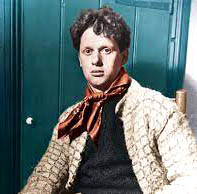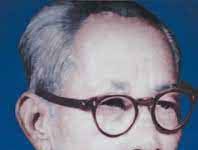Dylan Thomas-Brief Biography
Dylan Thomas
Dylan Thomas-Brief Biography
Once there was a boy of strangely confused character with weak lungs and the cleverness of truancy often suffering from a hemorrhage for which he feared that he would die young and yet was wayward, arrogant, spendthrift enjoying life-long penury and above all was a deadly drunkard who drank at least four bottles to eighteen a night – but later on, this boy became a controversially great poet, almost as a legend, of the twentieth country English, speaking world – the name of this queer boy was Dylan Thomas.
Dylan Thomas with such a strangely confused character was born on 27th October 1914 in England. He spent his childhood in the suburban district of Swansea, called the Uplands. His surrounding was fascinating and poetic rich with wild beauty.
As he had weak lungs and suffered from hemorrhage he could give little attention to his schooling. Yet he was sent to a private school that was socially superior but educationally inferior to the state primary schools. Dylan read in that school for some years but could learn little because he could not cope with the environment and discipline of the school and hence sometimes flew away from the school and avoided school examinations. Between his school and his home, there was a farm called ‘Fern Hill’ that belonged to his aunt. He frequented there and enjoyed the green grass and trees and boughs there.
At the age of eleven, he was sent to the Grammar school, Swansea in 1925, where his father D. J. Thomas was a teacher and taught English. The school was run by a wise and progressing headmaster who did not force his pupils against their grain, but only what seemed of use to them. Dylan Thomas, from his childhood, seemed to hate academic as well as private discipline and hence he spent his hours not reading the school curriculum but reading the Elizabethan poets and the works of William Shakespeare though he could not penetrate into their meanings. Here to note that he had some extraordinary victories in a long-distance running races which gave him pride all his life. At school, more significant to Dylan Thomas, than study, was his friendship with Daniel Jones who later on became his accomplice, inspirer and best friend. The friendship began with a fight at the age of fourteen. He was impressed by Jones that the latter had a strong will to be a composer, poet, novelist, piano- player, and violinist too. The Joneses’ home which was called ‘Warmly’ became Dylan’s second home.
In 1931, Dylan took up the job of a junior press reporter for the ‘South-West Daily’ post. In his spare time, he frequented Swansea taverns and boasted a great deal and drank more wine than was good for his health. During this period he began to practise his hand at writing verses.
In the meantime, another important theme in his life came when entered into a lengthy correspondence with a young poetess of London by the name of Miss Pamela Johnson. First, the two were pen-friends. In 1934, Dylan went to London to meet her and stays at her home for some days. But as he was feverish and a drunkard and interested in orgy so Pamela reacted violently and thus the relationship between the two came to an end.
In November 1934 Dylan left Swansea with his father’s blessings to begin his independent life and began to stay in a large room on Radcliffe Street. Here, in London, he became better known to the poets and editors of London. There he wrote reviews in the London Literary Magazines that were of little depth.
In December 1934 he published his first poetry book entitled 18 Poems. Then Dylan was becoming known mainly due to the championship of Stephen Spender. In London, he began a Bohemian life and drank and indulged in sex-orgies and had to retreat time and again to the seclusion of his Welsh home to recuperate and to write verses. He hired a beautiful but wild place on the coast of Ireland. There he lived in a house that he converted into a studio and there he could have some peace and could write in peace. Soon he was restless and suddenly, one morning he escaped to Swansea once again, without paying his bill. But at Swansea he could not stay long and then he went to London for the second time.
During his second visit to London, he stayed in Sapho. There he drank in the company of Caitlin Macnamara whom he began to love and with Constantine Fitzgibbon, his friend and biographer. All of them led the same kind of Bohemian life. Here he also came in contact with a number of literary figures from whom he borrowed and drank and who helped Dylan much to his literary fame.
In 1936 he published his second book of poetry, ‘The Twenty Five Poems‘ the three thousand copies of which immediately sold and it made Dylan well known as a poet. In the meantime, Dylan was introduced to a call girl and was caught by a venereal disease. The treatment of it was long and painful and the disease only encouraged Dylan’s sense of sin and pricked his conscience.
In the month of April 1936, Dylan suddenly married Caitlin Macnamara, his former associate and maiden friend in the company of whom he drank during his second stay in London. The marriage ceremony was a bare one as he had no money to spend, and no friends or relatives to attend. During this time he spent his days in extreme poverty and depended on the financial help of his friends and fellow poets.
In 1938 he moved to live in Laugharne where he earned his livelihood by working as labour. During this time, Mrs. Caitlin Thomas got pregnant and Dylan fell into the worries of paying the debt. Although his friend Lawrence Durrell contributed the occasional money, he failed to get a grant from the Royal Literary Fund. Debt drove him back to the house of Caitlin’s mother but pride brought him back to Laugharne again. In 1939 he published his third book of verse, The Map of Love.
His penury drove him to take screenwriting and soon achieved name and fame as a scriptwriter and he continued screenwriting till 1948, for full eight years and then he switched over to B.B.C. Broadcasting.
Mrs. Caitlin Thomas delivered her first son Lelewellyh in January 1939 and their second child, a girl, Aeronwy was born in 1943, and the third child a son named Colm was born in 1949. Penury was still a curse upon him and then a man named Margaret Taylor being sympathetic to him showed his charity by buying a home for the Thomas family at Laugharne. In 1947, with financial help from the “Society of Authors”, he paid a visit to Italy and after coming back from Italy he began to live at “Manor House” in Oxfordshire. By now his old father became shrunken and fell ill and his mother broke her knee and could not maintain her household duty, so he brought his parents to the Manor House at south Leigh in Oxfordshire and began to live with them.
In 1950 he went to the U. S. A. on his first lecture tour arranged by John Malcolm Brinnin. There in his lecture tour of three months, he achieved a roaring success, but there he drank too much night after night that began to destroy Dylan’s health. There he also did another deed of praise which was poetry reading. He had a mellow, sweet voice and by it, he could draw the attention of thousand audiences. He recited the poetry of Yeats, Auden, Lawrence, MacNeice, Sitwell Lewis, and finally his own poems.
In June of the same year, he return home from America and began to live in Laugharne and began to write Under Milk Wood which was to be printed in a private magazine run by Princess Catani. In 1952, Brinnin came to Laugharne to tempt Dylan back to America again. After Brinnin’s persuasion, Dylan along with his wife went to America for the second time which was more successful than the first tour but he returned home bankrupt. On the other hand, his son, Llewellyn, was turned away from school for failure to pay the fees. Dylan too had a succession of illnesses- pleurisy, bronchitis and gout. At the end of the year, Dylan’s father D. J. Thomas died with a cheerful heart as he saw his son be a great and reputed poet what he wished his son to be.
With the death of his father, Dylan began to be reckless and more and more thoughtful about his own death. On the other hand, debt grew bigger. His wife and children demanded food. With such ill health and with debt he went to America for the third time where he received the same and even more honour and praise from his American friends. In short, he was made a lion and was made drunk to delirium. After three months he returned home but when only a few months passed in Laugharne he again, for the fourth and last time went to America. There he drank so much at least four bottles to eighteen a night and at last, he died in New York on 9th November 1953.
Dylan Thomas, during his lifetime, wrote five poetry books besides some prose works. Thomas as a man was utterly conspicuous, but as a poet, he was moderate, refined and careful to the minutest use of words. Realism and symbolism were the main basis of his poetry. He, in his writing, was so much care that he wrote and wrote a piece of poetry and refined it, polished it, and sweetened it till it gave him satisfaction. For example, we may take his poem, Fern Hill of which about 200 drafts are still in existence.
As a poet, his place is after only T. S. Eliot and W. B. Yeats. But as a lyricist, his place is with W. B Yeats. Twentieth-century was a century of free verse, but his lyricism is an exception and exceptionally grand if compared with other contemporary lyricists. 0 0 0
N.B. The article ‘Dylan Thomas-Brief Biography’ originally belongs to the book ‘The World Writers-Brief Biographies‘ by Menonim Menonimus.
Books of Composition by M. Menonimus:
- Advertisement Writing
- Amplification Writing
- Note Making
- Paragraph Writing
- Notice Writing
- Passage Comprehension
- The Art of Poster Writing
- The Art of Letter Writing
- Report Writing
- Story Writing
- Substance Writing
- School Essays Part-I
- School Essays Part-II
- School English Grammar Part-I
- School English Grammar Part-II..
Books of S. Story by M. Menonimus:
Related Search:











